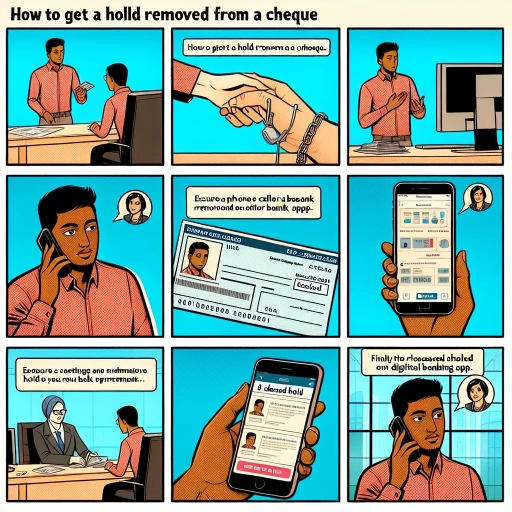How To Remove Hold On Cheque

Understanding the Concept of a Hold on a Cheque
The Basics of Cheque Holds
Cheque holds represent a period that a bank waits to ensure a cheque is genuine and that funds are available to be paid. They are a common practice meant to protect both the bank and the customer from fraud. Individual cheque amounts, the type of cheque, and the banking relationship are factors that can affect the length of hold time. Banks are mandated by law to disclose their hold policies to customers, giving the latter the ability to know when their funds will be available.
Reasons for Cheque Holds
Several reasons can necessitate a cheque hold. These include: a new account, repeat overdrafts, large deposits, suspicions of fraud, and cheque deposits made at ATMs. New accounts, defined as those under 30 days old, often have holds placed on their cheques as a precautionary measure. For accounts with habitual histories of overdrafts, banks will place holds to ensure funds are available before they are withdrawn. Large deposits, typically those over $5000, may attract a hold to safeguard against potential losses. Holds can also be placed on cheques that are suspected to be fraudulent due to irregularities in signature, amount or other details. Lastly, cheque deposits made at ATMs instead of human tellers can result in a hold due to lack of immediate verification.
The Duration of Cheque Holds
Banks set hold times according to regulations set by the Central Bank in their respective countries. For instance, in the US, the Expedited Funds Availability Act dictates how long hold periods should be. Generally, hold times range from two to seven business days, subject to the factors described earlier. However, the first $200 of the deposit must be made available by the next business day. It's also noteworthy that banks can release funds sooner at their discretion or extend the hold if they suspect fraud.
Steps to Remove a Cheque Hold
Communicate with Your Bank
Communication is usually the first step in trying to have a cheque hold lifted. Meet the bank in person or contact them via phone or online to explain why you need the hold removed. The bank might require proof, such as a receipt for a cheque or proof of the sender's good account standing. Remember, banks are regulated by law on how long they can hold cheques, but they can also decide to release the funds sooner.
Avoid Future Holds
While getting a hold lifted can be daunting, learning how to avoid holds in the future can be of great help. Some ways to do this are: build a positive banking history, make deposits during business hours, and avoid depositing large amounts at once. By building a positive banking history, showing that you can maintain your account well, banks would be less likely to place holds. Making deposits during business hours allows for immediate verification, which can help avoid a hold. Making split deposit for large amounts can circumvent holds placed on large deposits.
Consider Electronic Payments
Another way to bypass the process of cheque holds is to consider electronic payments. Electronic payments can be made through wire transfers, automated payment systems, or digital currency transactions. These forms of payment are almost immediate and do not necessitate a hold. Plus, they often offer more security features than traditional cheques, making them a reliable and convenient transaction method.
Legal Implications and Rights of Customers
Understanding Your Rights
It's essential that customers understand their rights concerning cheque holds. These rights are usually provided under the Expedited Funds Availability Act or a similar law in their country. Knowing these rights facilitates positive and transparent conversations with their banks. For instance, banks are mandated by law to disclose their hold policies, providing customers with valuable information concerning their deposits.
Seeking Legal Redress
If a bank does not adhere to its disclosed policy or the governing law concerning cheque holds, a customer has the right to seek legal redress. Contacting a lawyer or a banking ombudsman can put the customer on the right path towards resolving their issue. It's important to remember that laws and regulations are in place to protect both the banks and the rights of the customers.
Taking Precautionary Measures
While understanding rights is significant, taking precautionary measures can save customers from the inconvenience of cheque holds. These measures include asking for cashier's cheques, making a wire transfer, or even using digital transaction methods. These alternatives provide secure and efficient ways to deposit and transfer funds, thus eliminating the hold period. In conclusion, a combination of understanding, communication, and innovative financial practices can help customers remove or avoid cheque holds.